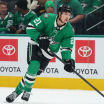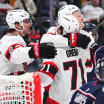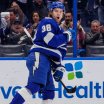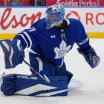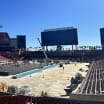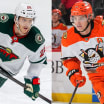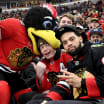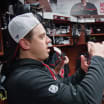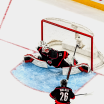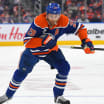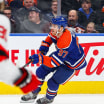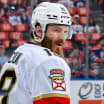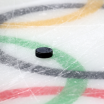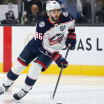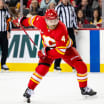Legendary hockey reporter Stan Fischler writes a weekly scrapbook for NHL.com. Fischler, known as "The Hockey Maven," shares his humor and insight with readers each Wednesday.
This week, Stan's monthly feature, "Voices From The Past," features Hockey Hall of Famer Frank Mahovlich. Stan originally interviewed "The Big M" in 1960 for Sport magazine. Since then, he's interviewed Frank several times, including at their get-togethers at the annual Canadian Society hockey dinners in Manhattan. This interview is excerpted from their chats.
Voices from the Past: Frank Mahovlich
'The Big M' won Stanley Cup six times on way to Hockey Hall of Fame
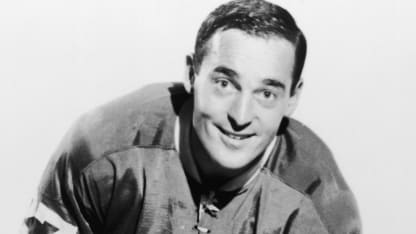
By
Stan Fischler
Special to NHL.com
What made you lean toward signing with the Maple Leafs?
"I took to hockey pretty easily and even before my teens, I was being watched by scouts. I remember being approached by a few NHL teams when I was 12. Leafs chief scout Bob Davidson was interested in me and sent a Father Flanagan from a private high school, St. Michael's College in Toronto, to try to get me to play for St, Mike's. At the time that particular school had a good hockey program and was like a farm team of the Maple Leafs. In a smart move, Father Flanagan had brought yearbooks from St, Mike's to show my family. The yearbooks showed famous players who previously had improved their hockey at St. Mike's. My dad was impressed not only by the St. Mike's tradition but that fellows such as
Red Kelly
of Detroit and
Tim Horton
of the Leafs were St. Mike's grads. The family agreed on St. Mike's and, for all intents and purposes, I was in the Leafs system at age 13."
When did you hit your stride at St. Mike's?
"During the 1954-55 season I got going. During 1956-57, I began feeling a lot of confidence ,and at the end of the season I won the Red Tilson Award as the league's top player. Joe Primeau, the former Maple Leafs center and who had coached me, presented the award. Joe was the best coach of my whole playing life. He was such a gentleman and so knowledgeable, and that's why Joe got my respect. I learned more from Primeau than any coach I ever had in the NHL."
1957-58 was your first full NHL season. How did you make out as a rookie?
"This was in a relatively low-scoring NHL era and I still managed to wind up with 20 goals and 16 assists for 36 points. That might not look impressive on paper, but one of the hockey writers said that it was 'Like being a .300 hitter in baseball.' Better still, all things considered, I beat out another rookie left wing,
Bobby Hull
, for the Calder Trophy as NHL rookie of the year."
What was the Toronto team like at the time?
"The Maple Leafs were in transition. They'd won the Stanley Cup in 1951, but then things started to slip. By 1957 they had missed the playoffs and management decided to put the accent on younger players. The nucleus consisted of defensemen like
Carl Brewer
and
Bobby Baun
and forwards such as
Bob Pulford
and myself. Meanwhile there was a transition in the front office where Punch Imlach took over coaching and managing. In my second full season, 1958-59, Punch had decided that our main goalie would be
Johnny Bower
. He was 34 at the time, which was pretty old for an NHL goalie to be a No. 1. But Bower got so good that he was nicknamed 'The China Wall' and was one of our heroes in an unbelievable homestretch playoff run in 1958-59. Bower turned out to be the hardest-working player I've ever seen; at any position."
What happened in that 1958-59 run to the playoffs?
"The team that we had to beat out was the New York Rangers. They had a strong team, with a bunch of aces like
Andy Bathgate
,
Bill Gadsby
,
Gump Worsley
and
Harry Howell
. They had finished a strong second the previous year, and a lot of media considered them second only to the defending Cup champs, the Montreal Canadiens. But they weren't playing up to their abilities and in 1958-59, didn't look like a second-place team. They had slipped to fourth and going into the next-to-last week of the season in March, they were in fourth with us in fifth."
How did you catch them?
"We were about seven points behind them with two weeks to go when things went our way -- my way too. We
beat New York 5-0
at Maple Leaf Gardens (on March 14) and then played them again at Madison Square Garden the next night. If they had beaten us we'd have been dead, but we took them,
winning 6-5
. We were hot and they were cold. Best example was our next game (March 19) at the Montreal Forum, where we rarely won -- this time
we took the Canadiens
(6-3). Going into the final two games for each of us, we had Chicago at Maple Leaf Gardens on Saturday night and Rangers were up against Detroit.
New York won that afternoon
and
we beat the Black Hawks 5-1 that night
-- I had two goals. That meant it all came down to the two Sunday games. If the Rangers beat Montreal, we were out, but if New York lost and we won in Detroit, we'd be in and they'd be out. Our game started an hour after their game so when we heard that
they lost
that really pumped us and
we beat the Red Wings 6-4
. It was quite a thrill, although the biggest thrill was yet to come -- winning the Stanley Cup!"
What was it like winning the Cup for the first time in 1962?
"The year after my 48-goal season (in 1960-61). I wound up with 15 goals less -- but it still was a gratifying year because I had 71 points (33 goals, 38 assists) and the whole team was clicking. Even though Johnny Bower was getting old, we had a good younger backup goalie in
Don Simmons
. We were good enough to finish second, 13 points behind Montreal. The Blackhawks were defending champs and they knocked out the Canadiens in the first round. Meanwhile, we beat the Rangers in six and then took on Chicago for the Cup. The Hawks were led by Hull and
Stan Mikita
up front with the great
Glenn Hall
in goal. They were good but we were better and won in six games. However, after we won Game 6 at Chicago Stadium, we were in the midst of having our locker room celebration when Punch burst in and yelled across the room, 'If you guys aren't on the bus in 15 minutes, you won't be on this team next year!' It wasn't the kind of downer reaction we wanted after such a big win, or had expected; to say the least."
How did you win three straight championships despite the animosity toward Imlach?
"The older guys managed to shrug him off. Once the games started, our leaders took over, and we had quite a few.
Red Kelly
had played with an Imlach type, Jack Adams, in Detroit, so he just adjusted. Same with (defenseman)
Allan Stanley
, who got booed out of New York when he was a Ranger. Other guys like our captain,
George Armstrong
, knew that he had to be the leader and that gave him motivation despite Punch. We had one guy lead on one night and another on another night. Teamwork was a very important factor in keeping us a winner."
How did you guys win the fourth Cup in 1967?
"It was a very up-and-down season, and we hit quite a downer in February. Punch got sick after a morning meeting and wound up in the hospital. His assistant, King Clancy, took over and everything changed for the better. King was 180 degrees different from Punch; he was easygoing and loosened the leash that Imlach had on us. That enabled me to play the free-and-easy style that I preferred. We won five in a row for King. After 10 games with him we lost only one and tied two. By then, Punch got out of the hospital and in the first playoff round we upset Chicago and then took out the Canadiens for my fourth Cup and last with Leafs."
How did you feel about being traded to Detroit in the middle of the 1967-68 season?
"It was like going into a store and fitting a nice glove on your hand. The Red Wings put me on a line with
Alex Delvecchio
at center and
Gordie Howe
on the right side. What a wonderful pair to work with; it was one of the best lines I've known. Everything seemed to fit into place, and we wound up breaking a goal-scoring record. Another thing I liked about Detroit was that the fans and papers weren't nearly as critical as they were in Toronto."
Were you surprised when Detroit traded you to Montreal in 1971?
"At first I was disappointed because I liked skating for the Red Wings. But (Canadiens general manager) Sam Pollock contacted me and we had a good talk. That and the fact that my kid brother,
Peter
, was already playing for Montreal convinced me to go ahead with the trade. Pollock reassured me that everything would be fine for me in Montreal, and he was right. The Canadiens had a great organization and Montreal fans showed me that they really appreciate the artistic side of hockey more than the roughness. I played on two more Cup-winners with Montreal."
